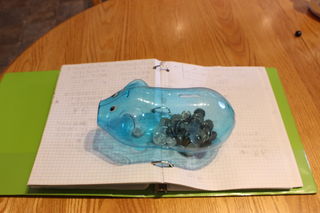As students, many of us may have a hard time with money. Whether that be saving or spending, it is hard to keep track of where it all goes.
Being a student means everything is expensive. Luckily, there are some perks we receive, like SPC or a student discount on select items. But in the end, it feels as if we are constantly spending regardless of what deals we look out for. So, of course, we want to do our best to save up what little we can. Below are 10 hacks on how to live an inexpensive life while you’re a college or university student.
1. BUY SECOND HAND: Buying books second hand can easily save at least half the original price. Typically, a university or college text book ranges from $100 to $150.
The reason for the high price is easily questionable and super annoying. For students, it is quite the commitment to spend that much money on a book you only need for about four months. However, buying from Kijiji or a friend can definitely decrease the price. Even checking out used book stores can make all the difference.
Claire Ingraham, a 21-year-old third-year Carleton University student, figured this out during her five years of studying between Algonquin and Carleton.
“This way, about 40 to 50 per cent on the regular price is being saved,” said Ingraham.
Ingraham looks for her books at the store Haven, a used book store near Carleton. However, there are different ones across the city available for students.
2. TAKE PUBLIC TRANSIT: Use that bus pass! Although it does come out of your tuition, a bus pass can be handy for many reasons. Not only do you not have to spend hours looking for a parking spot, you also don’t need to pay even more. Parking is a constant struggle when it comes to its cost.
For 18 year old Sarah Cohen, a second-year Carleton University student, taking the bus is one way she is able to save some extra cash. Cohen lives in Barrhaven, but goes to school in the east. Although the commute is a longer ride than most, it is definitely worth her time.
“I thought having a car would make my life easier,” said Cohen, referring to the long bus ride there and back. “Last year I would spend ten dollars a day to park my car, which is about 200 dollars a month.”
Cohen is a full time student, so like many others she is at school every day.
“Now that I bus, I’m able to save the much needed money,” she said
3. CONSIDER A CARPOOL: If busing isn’t an option or opting out of a U-pass was more practical, carpool.
Gas will always be a problem when you’re trying to save money. However, if you drive, you depend on it. So there’s no getting away from it. A simple solution that can help, even if only a little, is carpooling. Not only will this help reduce the amount of times you need to refill, but you can also enjoy some time with the person you ride with. Whether that is a friend, a neighbour or a parent, if you have their back and help them out, they’ll most likely return the favour.
Second year Carleton University student Nick Dunnion, 19, says this trick has saved him almost more than half the price on gas.
“I carpool with a friend of mine and it’s really helped when it comes to saving,” said Dunnion.
Dunnion and his friends take turns carpooling so in the end, this tip works for the both of them.
4. MAKE YOUR OWN COFFEE: We’re students. We’re all human. We need caffeine. But a coffee costs around two dollars to five dollars, which might not seem like a lot. However, if you’re at school five days a week for hours upon hours, it can add up.
Buying a coffee pot is 18 year-old Maya Avni, a second year Carleton University students, crucial advice.
“Those dollars (on coffee) add up everyday,” said Avni
If you commit to a coffee pot, you can make your own coffee without having to pay the extra two dollars for a shot of vanilla or an extra three for caramel topping. If you really want those flavours in your coffee, buying them at the grocery store is a lot cheaper. You’ll get more and it will last longer. This way you can create your own personal and cheaper coffee at home. Plus, you don’t have to wait in those long lineups.
5. STAY WHERE YOU ARE: If you live close to your school or live in an area that’s convenient for you to get to school, live at home. This doesn’t mean you need to spend the entire length of your program at home, because let’s face it, we all have FOMO (fear of missing out).
However, if your first year is spent at home rather than paying money to live elsewhere, you’re saving tons of money already.
For 18-year-old Alex Bhend, a first-year Carleton University student, he knows he made the right choice.
“I know a few people who decided to move into residence that live close to me,” he said. “It seems cool and fun and all, but it is a lot of money for something that I don’t need, considering where I live now.”
Bhend lives about 15 to 30 minutes away from the university depending on traffic, so he doesn’t find the commute to be long. In the years to come Bhend doesn’t know if when he’ll move out, but for now he’s happy with his decision.
6. SHARE COSTS WITH ROOMATES? : If you are moving out, make sure to connect with your future roommates. It is key you decide who brings what essentials and who is responsible for buying what product when you need to restock. This can become an easy way to save money.
For 19 year-old Amanda Sirotek, a second-year Carleton University student, this hack became a rule in the house in order to save some extra cash.
“The first week that we had all moved in, we were all bringing our own kleenex boxes and toilet paper and hand soap,” she said. “It wasn’t until the second or third week when we realized we had like seven different brands of toilet paper or five different salt shakers. Now we split up cleaning supplies and essentials.”
This way Sirotek and her roommates save a solid amount of money each shopping trip, and they aren’t overstocked on items.
7. BE SMART ABOUT GROCERIES: When planning and shopping for groceries, try to shop on Tuesdays. Loblaws offers a ten per cent student discount. Just make sure to register and have your student card on you when making the purchase.
23 year-old Vik Katyal, a second year Algonquin College student, has been keeping up with this advantage since starting school.
“Sometimes if I know I need something, I’ll try and wait for Tuesday,” said Katyal.
Grocery expenses can be a pain. You need food, so you will have to spend money on it regardless. However, ten per cent can make a huge difference, especially for students who need that money back, like Katyal.
Hypothetically, instead of spending 100 dollars, you only spend 90. Pocket the extra ten and each week you’ll be thankful you did. In the end, if you can wait until the following Tuesday, you have more money in your wallet.
8. EMBRACE CLOTHING STAPLES: Blue jeans, a white shirt and a pair of good shoes. How does this help save money?
19 year-old Delilah Edouard, a second-year uOttawa student, says having a staple clothing item in your wardrobe is a must. They help pull your wardrobe together and stop you from buying more.
Let’s say you have a blue pair of leggings. Instead of going out and buying multiple shirts with that shade of blue somewhere on it so it matches, you can throw on your white t-shirt. Two days later, when you want to wear a green pair of leggings, you can wear that same white t-shirt instead of buying a whole new outfit. This works the same with your blue jeans.
“I like black leggings, black shoes. That usually works really well and is simple to match with anything,” said Edouard.
Make sure you have a certain amount of clothing that can match with anything and you’ll notice you’re not spending nearly as much.
9. MAKE A BUDGET – AND STICK TO IT: This hack needs a little more planning and thought than the others, but can be extremely beneficial.
Set a weekly or monthly budget and do your best to not go over it. Being a student, budgeting can be hard. Especially with all the food and restaurants around. Whatever campus you are at there are food courts or restaurants close to you. However, if you bring your own food and stick to your set budget, tons of money won’t go to waste.
“Set up a budget and don’t eat out,” said 19 year-old Alex Adams, a second-year Carleton University student. “You can spend less than 50 dollars [CP: $50] a week on food and eat right and feel right.”
Adams created his budget for the sole purpose of saving. So far, he’s seeing positive results and is eating healthy.
10. MANAGE YOUR SAVINGS: Along with the hack above, managing your checking and savings account is a self controlled way to save money.
Most students have part time jobs or some way they make extra cash each week. Taking out a chunk of that and putting it into a savings account can help in the long run.
19 year-old Luca Curcio, a second-year Carleton University student tries to put about 50 per cent aside each paycheck. He does his best to not touch that portion during the school year.
“Managing your savings account so that you cannot withdraw from it during the school year,” is Curcio’s best advice to save up.
This way, if you can keep yourself from going into your savings, you’ll have tons saved up by the end of the year. If you don’t do your best to limit your spending, you will just spend more and end up regretting it.




this is the stupidest article I’ve ever read, nice originality “be smart”